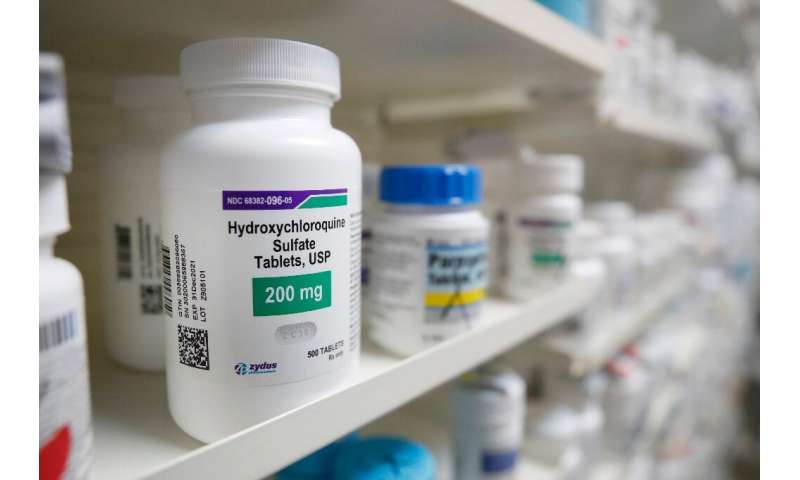Hydroxychloroquine shows no virus benefit, raises death risk: study

A study of nearly 100,000 coronavirus patients has shown no benefit in treating them with anti-viral drugs hydroxychloroquine and chloroquine and even increased the likelihood of them dying in hospital.
Hydroxychloroquine is normally used to treat arthritis but pronouncement from public figures including US President Donald Trump—who announced this week he is taking the drug—has prompted governments to bulk buy the medicine.
Chloroquine is an anti-malarial. Both drugs can produce potentially serious side effects, particularly heart arrhythmia.
And neither drug benefitted patients hospitalised with COVID-19, according to a study published on Friday in The Lancet.
Looking at the records of 96,000 patients across hundreds of hospitals, they found that administering the drugs actually increased the risk of dying.
They compared outcomes from four groups: those treated with hydroxychloroquine alone, with chloroquine alone, and then two groups given the respective drugs in combination with antibiotics.
There was also a control group of patients not given these treatments.
At the end of the study period around nine percent of those in the control group had died.
Of those treated with hydroxychloroquine or chloroquine alone, 18 percent and 16.4 percent respectively had died.
And those given each drug in combination with antibiotics were even more likely to die: 22.8 percent with chloroquine and 23.8 percent with hydroxychloroquine.
The authors estimated that the drugs put patients at up to 45 percent higher risk of dying from COVID-19 compared with underlying health issues.
"Treatment with chloroquine or hydroxychloroquine does not benefit patients with COVID-19," said Mandeep Mehra, lead author of the study and executive director of the Brigham and Women's Hospital Center for Advanced Heart Disease in Boston.
"Instead, our findings suggest it may be associated with an increased risk of serious heart problems and increased risk of death."
'Landmark for treatment'
Despite Trump's enthusiasm for using hydroxychloroquine for COVID-19 treatment, his own government's Food and Drug Administration warns against it.
Brazil's health minister on Wednesday recommended using chloroquine and hydroxychloroquine to treat even mild COVID-19 cases.
Britain has ordered £35 million ($42 million) worth of hydroxychloroquine, despite numerous studies showing it is ineffective in treating COVID-19 and may even be more dangerous than doing nothing.
"Several countries have advocated use of chloroquine and hydroxychloroquine, either alone or in combination, as potential treatments for COVID-19," said Frank Ruschitzka, director of the Heart Center at University Hospital Zurich and co-author of the study.
"We now know from our study that the chance that these medications improve outcomes in COVID-19 is quite low."
Stephen Griffin, associate professor at the University of Leeds' School of Medicine said the Lancet research was "potentially a landmark study for COVID-19 therapy".
"The indications are that these drugs certainly ought not to be used outside of a trial setting where patients can be monitored for complications," said Griffin, who was not involved in the study.
"It is clear that high profile endorsements of taking these drugs without clinical oversight is both misguided and irresponsible."
Explore further
Lancet. 2020; (published online May 22.) doi.org/10.1016/S0140-6736(20)31180-6
© 2020 AFP








 User Center
User Center My Training Class
My Training Class Feedback
Feedback












Comments
Something to say?
Log in or Sign up for free